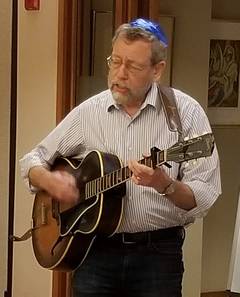The Waters Are Risin' - Michael Biales
06/08/2019 07:00:00 PM
Michael Biales shared this at Tikkun L'eil Shavuot, June 8, 2019
In late 2015 during the presidential primaries, I was noodling on the guitar and played a chord progression that I liked and the words “the waters are rising” came to me – words that probably arose out of my distress concerning the tenor of the Trump campaign. However, the song (which has nothing to do with Trump) turned both biblical and humorous. Though humorous, it is basically accurate to the Tanakh except for one thing – maybe you will spot what that is.
Click arrow to hear song from Michael with lyrics below.
The Waters Are Risin’
© 2018 Michael Biales
Yes, the waters are risin’ – better move to higher ground
So, did you spot the inaccuracy? Noah did not argue with God. Apparently, some commentary suggests that Noah was not the first Jew because he did not argue with God – but not about the ark – about destroying the world. However, that’s not what I want to talk about.
When I wrote this song, I thought that it was just a funny song. But a few months ago it struck me that my subconscious might have been more involved than I suspected. Moses and Jonah (and my-version-of-Noah) were reluctant to do the right thing, but relented in the face of God’s insistence. And – without equating myself with biblical figures – I realized this is me in that I do not want to be a social activist (which, when you think about it, is what the prophets were). And yet I find myself compelled to be a member of CBE’s social action committee, Na’aseh.
Na’aseh is Hebrew for “we will do.” And what are we to do? Na’aseh activities are related to tzedákah (which actually means “righteousness” or “justice”, not just “charity”) and tikkun olam (“repairing the world”); our activities have been focused on the environment, immigration, and fighting anti-Semitism, racism and other forms of hate.
My own involvement with Na’aseh has been mainly immigration. My Jewish connection to helping immigrants is due to an awareness that our history overflows with immigrations. For me, this was most grounded in modern history, for example, my grandparents’ immigrations in the early 20th century and the heartlessness of America forcing the refugees aboard the ship St. Louis to return to the horrors of the Germany that they were trying to escape. As I became involved in immigration issues, I learned more history, such as the fact that our modern immigration laws are the spawn of laws created to keep Poles and Italians and Jews – such as my grandparents – from polluting America. I learned that the first Jews to immigrate to North America over 360 years ago were immigrants from – of all places – South America. They were living in a Dutch colony in what is now Brazil and fled the Portuguese Inquisition when the Portuguese took over the colony. And, like modern immigrants from south of our border, there was an attempt turn these Jewish immigrants away. Luckily, the Dutch West India Company overrode Peter Stuyvesant’s desire to expel them.
But what is interesting on this Shavuot is not so much that my Judaism led me to social action, but that my social action led me to learning more about Judaism. I learned about tikkun olam and the actual meaning of tzedákah. I learned that the word “Hebrew” derives from “ivri” (to traverse or cross over) – Abraham was Avram ha-ivri, “Avram the border crosser.” This biblical designation was prescient, for we Hebrews are perennial border-crossers. I pray that American Jews will not someday have to again be border-crossers, but history is not reassuring.
My involvement with Na’aseh led to learning about the Tanakh’s support for immigrant justice. For example, Leviticus Chapter 19, instructs us: “When strangers sojourn with you in your land, you shall do them no wrong. The stranger who sojourns with you shall be to you as the native among you, and you shall love them as yourself, for you were strangers in the land of Egypt.” This is the immigration policy ordained in the Torah! I learned that treating the stranger well is mentioned 36 times in the Scriptures. [Hold up sign] This is a condensed quote from Jeremiah that I carry at the Jericho Walk demonstrations at the Burlington Mall ICE facility. I should ask Rabbi Mike what moral directives are mentioned more often than this, but one has to assume that this is one of the most important teachings because of its frequency. Learning this reminded me also of Hillel’s distillation of Judaism, “What is hateful to you, do not do to your neighbor. That is the whole Torah; the rest is commentary – go and study it!” And are these immigrants not our neighbors?
The haggadah says, “In every generation we are obligated to see ourselves as though we personally went out from Egypt.” And yet, even when I see images of immigrants at our southern border, I know that I cannot begin to imagine the reality of that experience. Sometimes when I try to conjure up what it might have been like to have gone out from Egypt, a different image troubles my sight. What would it have been like if the Egyptian chariots, instead of bearing down on the Hebrews – on us – as we escaped Egypt, were waiting on the far side of the Red Sea to prevent us from entering the Sinai?
Even with the waters rising (as they currently are!), trying to do a little to “repair the world” is not comfortable for me – is not how I want to be spending my time. And yet, without being swallowed by a whale, I am doing at least a little something. And maybe – like Moses in my song – I do have to do this to save my sorry tush.

